1. What punishment did Christ warn would ultimately befall those who refuse to quit sinning? Mark 9:43. (He obviously did NOT mean we should literally “cut off” parts of our bodies, but rather stop using them to commit sin!)
COMMENT: “Hell” is an English word. When Mark recorded Christ's words, he wrote them in the Greek language. The Greek word translated “hell,” which Mark was inspired to write down, is gehenna. Since in this verse Christ says the sinner is “to go into hell, into the fire,” it follows that those who go to gehenna will receive punishment by fire.
Keep in mind then that Christ associated the Greek word gehenna with fire.
2. What did Christ say in Mark 9:45 to emphasize what He said in verse 43?
COMMENT: Mark wrote down the same Greek word gehenna here in verse 45 that he used in verse 43. The translators of the Authorized or King James Version of the Bible of A.D. 1611 selected the English word “hell” to translate this Greek word gehenna. We will learn more about the real meaning of this word later.
3. How did Christ reemphasize what He said about “hell fire”? Verse 47.
COMMENT: Again, the Greek word which Mark used in this verse is gehenna. Gehenna clearly refers to fire! But there are other original Greek and Hebrew words in the Bible that are also translated “hell.”
Let's read what A Dictionary of the Bible, edited by James Hastings, says about the use of the word “hell” in the Old and New Testaments. Keep in mind as you read this that the Old Testament was originally written in the Hebrew language, and that the New Testament was originally written in the Greek language.
Hastings says: “In our Authorized Version the word hell is unfortunately used as the rendering of three distinct words, with DIFFERENT IDEAS [or meanings]. It represents, 1) the 'sheol' of the Hebrew Old Testament, and the 'hades' in the New Testament… It is now an entirely misleading rendering, especially in the New Testament passages. The English revisers, therefore, have substituted 'hades' [going back to the original Greek word] for 'hell' in the New Testament… In the American revision the word 'hell' is entirely discarded in this connection...
“The word 'hell' is used 2) as equivalent to [the Greek word] 'tartaros' (II Peter 2:4) …and, 3)… as the equivalent of [the Greek word] 'gehenna'…"
So we see that the real meanings of three different Greek words – hades (equivalent to the Hebrew sheol of the Old Testament), tartaros and gehenna – have been confused with each other because translators have attempted to make the one English word “hell” cover the definitions of all three words! No wonder millions have been confused about this subject.
What do these words really mean?
The Old Testament Hebrew word sheol and the New Testament Greek word hades mean the same thing – simply the grave. These original words have been correctly translated as “grave” in many places in the Bible. However, these words have also been translated “hell.”
“Hell” is an old English word. Over 350 years ago, when the Authorized Version was translated, the people of England commonly talked of “putting their potatoes in hell for the winter” – a good way of preserving potatoes – for the word then meant merely A HOLE IN THE GROUND which was covered up – a dark and silent place – a grave! But pagan teachings caused people to misapply the old English word “hell” to the lurid imaginations of Dante.
The second Greek word, tartaros, which has also been translated into the English word “hell,” occurs only once in the New Testament (II Pet. 2:4). It does not refer to humans, but the restrained condition of fallen angels (or demons). Its meaning, translated into English, is “darkness of the material universe,” “dark abyss,” or “prison.”
But what about gehenna? This Greek word is derived from the name of the narrow, rocky Valley of Hinnom, which lies just outside Jerusalem. It was the place where refuse was burned up. Trash, filth, and the dead bodies of animals and despised criminals were thrown into the fires of gehenna, or the Valley of Hinnom. Ordinarily, everything thrown into this valley was destroyed by fire – COMPLETELY BURNED UP. Therefore, Christ used gehenna to picture the fate of unrepentant sinners!
In many of the passages of the New Testament where we see the word “hell,” the original Greek word is not gehenna. Often it is hades – which does not refer to fire at all, but to a grave – a hole in the ground. Yet the translators have confused and obscured the two entirely separate meanings of these words by indiscriminately rendering them both by the same English word “hell.”
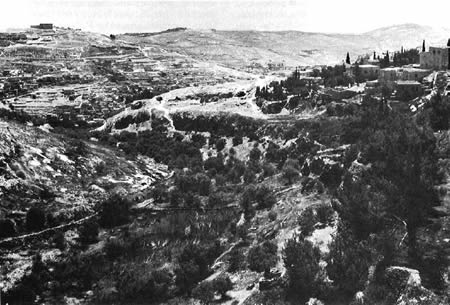 Z. Kluger
Z. KlugerTWO DIFFERENT “HELLS”: The Greek word gehenna-translated “hell” in the Authorized Version of the New Testament-refers to the Valley of Hinnom just outside Jerusalem where, in the days of Jesus, refuse was thrown to be burned.
Let's study the proof.
1. What did Jesus say about “hell” in Luke 12:5?
COMMENT: If you were to look up the original Greek word that is here translated into the English word “hell,” you would find it is gehenna. Gehenna, remember, is the place where dead bodies were thrown and destroyed by fire!
2. How is the same English word “hell” used in Acts 2:31?
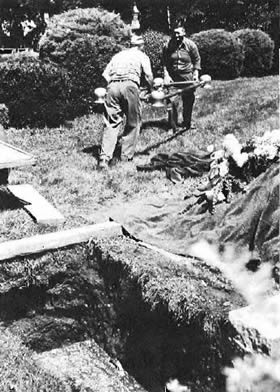 Ambassador College
Ambassador CollegeThe Greek word hades, also translated “hell”, simply refers to a grave-a hole in the ground!
COMMENT: The original Greek word which is translated into the English word “hell” in this verse is hades. Hades means the grave, as its usage in this verse clearly shows! We can plainly see that the English word “hell” can have differen t meanings! So when we come to the word “hell” in the New Testament (except for II Peter 2:4), we must keep in mind these two vastly different meanings and carefully determine by the context whether it refers to destruction by fire, or the grave where the dead lie buried.
Whenever you're in doubt about the intended meaning of the word “hell” in the New Testament, look it up in an exhaustive concordance, such as Strong's or Young's, to see which Greek word it was translated from, and hence its true meaning.
In the preceding lesson we learned that when a person dies and is buried in his grave, he knows absolutely nothing (Eccl. 9:5). He merely lies quietly and silently there as in a “sleep,” totally oblivious to everything.
Let's briefly review this important truth.
1. What one thing befalls both men and beasts? Eccl. 3:19. Do they all go to one place – the same place – when they die? Verse 20 and Genesis 3:19.
COMMENT: Have you ever heard of beasts going to “hell” to be tortured?
2. What place does God say man goes to when he dies? Eccl. 9:10. Did Job realize he would go to the grave after death? Job 17:13.
3. Was the One who became Jesus Christ “made flesh”? John 1:14 . Did Christ take upon Himself the same mortal flesh of which we are composed? Heb. 2:14. And didn't He also have to go to the grave as other mortal men do? Acts 2:31.
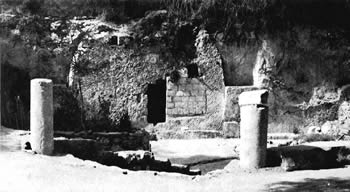 Ambassador College
Ambassador CollegeGARDEN TOMB: This is believed by many to be the tomb where Jesus was buried. Thus Jesus was in “hell” (a grave-Greek hades) for three days and three nights.
COMMENT: The original Greek word in Acts 2:31 is hades which, as you now know, means the “grave.” Jesus' “soul” (body) did not see corruption (did not decompose in the grave) because He was resurrected after three days!
Some theologians, however, maintain the tradition that Christ was preaching to departed human “spirits in prison” (I Pet. 3:19) while He was in “hell.” That idea is absolutely false. Verse 20 of I Peter 3 makes it plain that those to whom Christ preached were demon spirits, and that He preached to them during the days of Noah! This verse could not at all be referring to the three days and three nights Jesus was dead in the grave!
You may have heard ministers preach that the “unsaved” go directly to the “fiery tortures of hell” when they die. If people have immortal souls and if there is a place of eternal torment, this teaching would mean they are condemned to a fiery inferno before they are formally judged and sentenced! Let's notice when and how the dead will be judged by God.
1. Is there to be a future resurrection to judgment of the unsaved dead? John 5:28-29. (The word “damnation” in the King James Version – verse 29 – is correctly rendered as “judgment” in most modern translations.)
COMMENT: Here is further proof that the unsaved dead are not being tormented in a “fiery hell.” They are now dead! But there is coming a time (“the hour is coming,” said Jesus) when they will be resurrected for judgment.
2. Does the first sentence of Revelation 20:5 and verses 11-12 also prove there is to be a future resurrection to judgment? (Note that the first sentence in verse 5 is a parenthetical statement inserted within verses 4-6, which describe the first resurrection.)
COMMENT: Some of the dead – the “dead in Christ” will be resurrected to eternal life in the first resurrection at Christ's Second Coming (I Thess. 4:16-17). But the “rest of the dead” will not live again for a thousand years. They will then be resurrected to mortal life. These are the unsaved dead who will rise in the second resurrection to be “judged.”
The Great White Throne Judgment described in Revelation 20:11-12 is the period when the vast majority of mankind (the dead, and most who are now alive) will be resurrected and given their opportunity to learn about God's plan of salvation. These billions are those who never heard or understood God's truth (including those who thought they knew God, but had not been called of God – John 6:44). They will be judged daily by how well they live by the Word of God (the “books” in verse 12 are the books of the Bible), just as true Christians are being judged daily today (I Pet. 4:17).
At the end of this period of judgment, God will render a sentence – a verdict – for each individual. The vast majority will inherit eternal life. Those few who reject God's truth and stubbornly refuse to repent will be sentenced to eternal death, not eternal punishing.
3. Is there then to be a resurrection of all the incorrigible dead? Rev. 20:13-15.
COMMENT: After the Great White Throne Judgment period, the incorrigible dead of past ages, who may have perished at sea, or on land (the Greek word for “hell” in verse 13 is hades), will be resurrected to physical life. They will then be formally judged by God and sentenced to eternal death!
The subject of “judgment” is thoroughly covered in an upcoming lesson. Suffice it to say that the Bible clearly shows that the dead are dead, and that the time when the “unsaved” dead will be judged is STILL IN THE FUTURE!
What is the ultimate penalty – the “wages,” or reward – of sin? Is it eternal life in torment? Or is it eternal oblivion? What IS the ultimate fate of incorrigible sinners? The Bible makes the truth very clear.
1. What is the “wages of sin”? Rom. 6:23.
COMMENT: The “wages of sin is DEATH.” Death is the opposite of life! The final wages the incorrigible will receive is the complete cessation of life!
2. What does Paul warn will be the judgment or sentence of those who, knowing God's commands and having tasted of His way of life, sin willfully? Heb. 10:26-27. Will they live on in torment in fire – or will they be “devoured” by it? Verse 27.
3. Does Jesus compare false ministers who don't bring forth good works to trees that don't bring forth good fruit? Matt. 7:15-19. What did He indicate would happen to them? Verse 19. Is combustible material that is put into a fire only tormented – or is it burned up? Did Christ indicate that all who do not bring forth “good fruit” will likewise be cast into fire? Verses 17-19.
4. What did Christ say to the unrepentant scribes and Pharisees of His day? Matt. 23:33.
COMMENT: The original Greek word translated here as “hell” is gehenna – meaning the Valley of Hinnom. Christ used the fire that burned up refuse in the Valley of Hinnom as a type of the final fate – complete destruction – of the wicked by fire. Those rebellious and stubborn religious leaders could well understand Christ's analogy. They knew they were being threatened with complete destruction in fire!
5. What did Christ warn would happen to those who will not repent of their sinful ways? Luke 13:3.
COMMENT: “Perish” means to cease existing. It does not mean to continue living. Life in eternal torment is not what God has decreed for incorrigible sinners!
The punishment revealed in the Bible is death – cessation of life forever. Eternal life is something we were NOT born with. It is a gift of God which He will bestow upon those who obey Him. Eternal life and death are contrasted throughout the Bible!
6. Did Christ show by His parable of the tares that there is to be a future harvest? Matt. 13:30. Did He say the evil people – the “tares” – will afterward be BURNED? Same verse.
COMMENT: In this parable Christ likened the earth to a “field” (verse 24), the obedient people to “wheat” (verses 25, 29), and the disobedient to “tares” (verses 25, 29, 30).
7. Does Psalm 37:20 also show that the ultimate fate of the wicked will be destruction by fire? Will this fire be so hot that it will burn up – CONSUME -- the wicked? Same verse and Malachi 4:1. What will be left of the wicked? Verse 3. Who will burn up the wicked – Satan and his demons, or the Eternal God? Same verse.
COMMENT: The “hell fire” that the Bible speaks of will be thousands of degrees HOTTER than the imaginary “hell fire” of most preachers – which is only hot enough to torment. The Biblical “hell fire” will totally consume the disobedient! Never will they exist again.
The Bible plainly shows that those who have known God's truth and willfully disobey and refuse to repent, will reap the wages of sin – eternal death! (Rom. 6:23). This scripture means what it says. The attempts of many theologians to explain away death and to interpret it as mere “separation from God” cannot be reconciled with Scripture. Death clearly does NOT mean eternal life in the horrifying torments of an eternal “hell.”
The author of this pagan deception is none other than the father of lies – Satan the devil! (John 8:44). If you have believed his false doctrine and have suffered mental torment because of it, thank God that He has now opened your mind to understand the TRUTH!
And now comes a most interesting revelation! Exactly what is the gehenna fire that will consume the wicked? When and where will it occur?
1. Are all who stubbornly refuse to repent and who persist in breaking God's commandments ultimately to find themselves in a lake of “fire and brimstone”? Rev. 21:8.
COMMENT: We've already seen that the fate of the wicked is gehenna fire. So gehenna and the lake of fire are the same. A very large fire would have the appearance of a fiery lake, hence its description.
2. Will it cause the death of the wicked? Notice Revelation 21:8 once again. Which death will it cause? Same verse.
COMMENT: Mortals naturally die once, because we just “wear out” (Heb. 9:27). But if anyone dies the second death, that individual will have been judged by God to be guilty of persistent disobedience and incorrigible rebellion. The second death will be for all eternity!
3. Does Revelation 20:13-15 verify that the incorrigible will be cast into this future lake of fire?
4. Does a forerunner of this lake of fire begin at Christ's second coming? Rev. 19:20. Will the two chief human enemies of Christ be cast into it at that time? Same verse.
5. How long will this fire last? Matt. 25:41.
COMMENT: The word “everlasting” is aionion in the Greek. Aionion comes from the root aion which often means “age.” In this case, the correct translation into the English language should be “AGE-LASTING fire.” This “lake of fire” is going to be burning all during the Millennium – the “age” of Christ's rule.
During the millennial reign of Christ and His saints, the fires in the Valley of Hinnom will again be kept burning as a stern witness to all the rest of the world! (Isa. 66:23-24).
6. Much later – after the Millennium and after God's plan for mankind is complete – will the flames of the “lake of fire” purify the earth's surface, burning in one vast worldwide inferno? II Pet. 3:10. Will all the things man has created be burned up, as well as the rest of those people who will not have received salvation and eternal life because of willful rebellion against God? Same verse and Revelation 20:15 once again.
COMMENT: Here is God's – not man's – description of what the final “hell fire” will be like! It is yet in the future. It has not yet occurred. Nothing is said anywhere in the entire Bible about “souls” descending into the earth into “hell fire,” or of torture for all eternity! Rather, the Bible shows that all incorrigible human beings and their works will suffer destruction once for all eternity. All other teachings to the contrary have come to us from paganism!
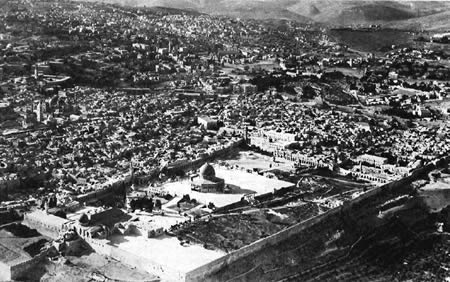 Z. Kluger
Z. KlugerDESTRUCTION BY FIRE : As prophesied in the Bible, “unquenchable fire” destroyed the city of Jerusalem over 2,500 years ago, which has since been rebuilt.
7. Are the wicked to be reduced to ashes by the fire which will consume the earth's surface? Turn to Malachi 4:3 once again. Can ashes he tormented forever and ever? Of course not! The death the incorrigible wicked will have suffered will be an eternal, everlasting punishment, not an everlasting punishing. There is a big difference between punishment and punishing! “The wages of sin is death" (Rom. 6:23), not eternal life in hell fire!
8. Will Satan be cast into the same fire that will have consumed the “beast” and the “false prophet”? Rev. 20:10.
COMMENT: Notice that Satan himself will be in “hell fire.” But since he is a spirit being, he will not be destroyed by the flames (see Luke 20:36). Neither will he play the role of torturing people as he is often represented by the doctrines of this world. Revelation 20:10 shows that Satan is to be TORMENTED unto the ages of the ages – “FOREVER AND EVER”! His torment will last forever. But not this fire. It will last only as long as combustible material remains to be consumed. Satan's eternal torment will be mental anguish resulting from seeing all that he has striven toward, worked for and plotted for burned up as the earth is purified by fire! No wonder Satan has deceived humans into believing that the fate of sinners is condemnation to eternal torments!
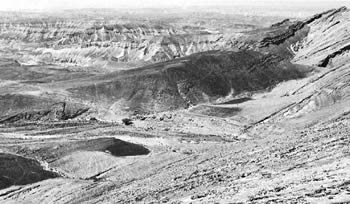 Z. Kluger
Z. KlugerNo one really knows exactly where in the Negev the cities of Sodom and Gomorrah were located, but the desolation of this wilderness is typical of the utter destruction of both sites after their incineration by “eternal fire”!
9. Will the beast and the false prophet still be in this fire? Rev. 20:10.
COMMENT: Some Bibles use italics to show that the word “are” in this verse was supplied by the translators. It is not found in the Greek manuscripts. The phrase should read, "where the beast and the false prophet were" – the unwritten verb in the Greek should be understood to be in the same tense as the verb in the first half of the sentence. The Amplified Bible has it correct. These two mortal individuals will have been destroyed 1,000 years before the time Satan is cast into these flames.
1. Did John the Baptist ever speak of “unquenchable fire”? Matt. 3:12; Luke 3:17.
2. Did Jesus say that hell fire will never be “quenched”? Mark 9:43-48. (Recall the Greek word for “hell” in verses 43, 45 and 47 is gehenna.)
COMMENT: Jesus repeated this statement five times for emphasis. Thus, people have carelessly assumed the “fire that never shall be quenched” (verse 43) is a fire of torture which has been in existence for centuries, and will continue to exist for eternity. But we have proved that this idea is absolutely false! Notice the Biblical truth about unquenchable hell fire.
3. Did God (over 2,500 years ago) warn the inhabitants of Jerusalem that He would kindle a fire in Jerusalem's gates that would not be quenched? Jer. 17:27. But what would that fire do to the city's palaces? Same verse.
COMMENT: This fire occurred a few years later, and it destroyed all the houses of Jerusalem (Jer. 52:13). Since God said this fire “shall not be quenched” and since it is not burning today, it obviously went out by itself after devouring all combustible material!
4. What punishment befell the notorious cities of Sodom and Gomorrah? Gen. 19:24. Was it literal fire that destroyed human beings? Luke 17:29. What do we read in Jude 7 about this event? Is there still a fire burning in those cities which God destroyed long ago? Prov. 26:20.
COMMENT: Of course not! The expression “eternal fire” in Jude 7 means a fire whose results are permanent or everlasting – obviously not a fire that burns forever! Sodom and Gomorrah were utterly destroyed centuries ago – they are not burning today.
The fires which burned these wicked cities simply died out after consuming all combustible material. These scriptures prove the “fire that never shall be quenched” will NOT torment people forever!
The fires were never quenched or put out prematurely by anyone! The flames merely died out when they had nothing more to consume. Even so it will be with the FINAL gehenna fire that will consume the wicked. It will be unquenched – but it will finally burn itself out!
A startling statement is found in Mark 9:44, 46 and 48. In these verses, Christ spoke of a worm that “dieth not.” Are these immortal worms?
Some people think Jesus referred to people as worms, and that He was trying to say that these “people” never die but live on forever in agonizing torment. However, those who believe this fail to notice that what Jesus spoke of was “their worm.” So the wicked themselves are not the “worm.”
What is this mysterious “worm” that does not die? Notice what Jesus really meant.
Jesus clearly had reference, as the marginal notes of many Bibles show, to Isaiah 66:24, where a similar statement is made about “their worm” – the worm of “carcasses.” (Be sure to read this verse in your Bible.)
Now what is the “worm” of a decaying carcass? If you have ever seen a putrifying carcass, the answer should be obvious. To put the matter beyond all doubt, we find that the lexicons define as grub or maggot both the Greek and the Hebrew words translated as “worm” in Mark 9:44 and Isaiah 66:24.
When a dead body occasionally lodged on one of the rocky ledges above the garbage fires of the Valley of Hinnom, it was soon infested by many worms or maggots, which hatched out of eggs laid by flies. It was simply these worms to which Christ referred when He said, “their worm dieth not.”
But Jesus didn't mean that each individual worm continued to live forever! Actually, the larvae – maggots – would hatch from eggs, eat the flesh, continue in the larval form only a few days, then go through pupation or metamorphosis and finally emerge as flies! The worms didn't die – they became flies! Later, the flies died.
These are facts known by any student of biology! And Christ was not ignorant of them.
By contrast, the misunderstanding of Christ's simple statement by some people should be an object lesson to always be careful to use wisdom and common sense in studying God's Word. The Holy Spirit is the spirit of a sound mind (II Tim. 1:7). The Bible is one book that makes good sense! Let's always study these perplexing scriptures carefully and not jump to hasty, erroneous, weird conclusions.
Jesus' parable of Lazarus and the rich man (Luke 16:19-31) is perhaps one of the texts most frequently used by those who attempt to prove there is an eternal hell fire.
What lesson did Jesus intend to illustrate by this oft-misunderstood parable? Let's carefully study this entire parable, comparing it with other crystal-clear scriptures.
1. Did Lazarus – a poor but righteous beggar – die? Luke 16:22. Was he later carried by angels to “Abraham's bosom”? Same verse.
COMMENT: If we are Christ's, we become heirs with Abraham to receive the promises God made to him (Gal. 3:29). Through faith we may all become the spiritual “children of Abraham” (Gal. 3:7). This is an intimate relationship – a close or bosom relationship, spiritually speaking – with Abraham. We are to be in close contact with him in sharing the promises. This is the sense in which righteous Lazarus was taken to “Abraham's bosom.”
When, then, will Abraham and the Lazarus of Jesus' parable actually receive the promises? The answer given in the Bible is that Abraham and the saints – his spiritual “seed” – will inherit the promises at the resurrection of the just, when Jesus Christ returns to earth to establish the Kingdom of God! (The Christian's inheritance is the subject of the next lesson.)
2. And what about the sinful rich man of Jesus' parable? Did he also die? Luke 16:22. Do we next see him lifting up his eyes, indicating his having been resurrected, and calling to Abraham for a few drops of water to cool his tongue, being in mental torment? Verses 23-24.
COMMENT: The word “hell” used here is translated from the original Greek word hades, which we know means the “grave.” It is not from the Greek word gehenna, which represents the future lake of fire that will DESTROY the wicked forever. The rich man is pictured at the very moment he comes up out of his GRAVE in a resurrection!
Abraham and Lazarus will have already inherited eternal life in God's Kingdom (Matt. 25:34). They will have been immortal for over 1,000 years BEFORE the wicked rich man is resurrected to be burned in the lake of fire (Rev. 20:4-5, 13-15). Until then, the rich man will have been dead in his grave, having no consciousness of the passing of time (Eccl. 9:5).
At his resurrection, the rich man will see the flames of the lake of fire beginning to surround him. He knows these flames will destroy him forever. Being in great mental agony, he asks for just a little water to cool his tongue, which has become dry from his mental anguish. He does not ask for buckets or oceans of water to put the fire out. He knows such a request would be denied.
3. What did Abraham then answer the rich man? Luke 16:25-26.
COMMENT: The great “gulf” between the two will be the difference between mortality and immortality. Those who will have been made immortal shall never die because they will have been born of God (Rev. 20:6). Abraham and the beggar will be on the immortal side of this gulf – the rich man on the mortal side, facing imminent eternal death by fire!
Many of the condemned, like the rich man, will want their relatives warned (Luke 16:27-28), not realizing how much time has elapsed since they died and that all other people will also have already had their chance to receive salvation.
The parable of Lazarus and the rich man does not prove eternal punishing by God in hell fire. Rather, Christ used this short illustration to picture to His listeners the REALITY of the resurrection from the dead of both the righteous and the wicked. He was picturing the resurrection to ETERNAL LIFE as contrasted with the ultimate fate of the wicked – the resurrection to die ETERNAL DEATH!
Why do so many people have a false concept of “hell”? Because they have been deceived and do not understand God's overall purpose for creating mankind.
God's purpose for man is that he develop the holy, righteous character of God, which will make him fit to receive the precious gift of eternal life. But God created man of the dust of the ground, subject to death, so that if he failed to develop righteous character, he could be released from his misery by death.
 Wide World, Deutsche Press, British Railways
Wide World, Deutsche Press, British RailwaysALL TO HAVE THEIR CHANCE: The day is coming when our loving Creator will give all who ever lived a chance to understand His way to salvation.
God has no desire to torment or to torture anyone. God is love (I John 4:8). He created us mortal for our own good. He will condemn no one because of ignorance, and will see to it that every person ultimately learns the truth and has a real opportunity for salvation upon sincere repentance, no matter how terrible his or her sins have been.
But if God were to grant eternal life to those who persistently rebel; who stubbornly refuse to repent; who fail to develop righteous character, they would simply bring misery upon themselves as well as others for all eternity! Certainly the kindest and most merciful thing God can do for all involved is to deny continued existence to such rebels. God will simply put incorrigible sinners to DEATH – not mercilessly torture them forever!
And so the obedient will be given the free gift of eternal life. But the disobedient must be paid the “wages” they have earned (Rom. 6:23). It is the final or second death – eternal death in the lake of fire. These are the two alternatives God places before each of us.
This truth should not inspire unreasoning terror as the satanic, pagan doctrine of eternal punishing in hell fire has caused in so many sincere, but deceived people. On the other hand, the lake of fire should stand as a WARNING to all who know God's truth and still stubbornly refuse to obey it!
You have now proved for yourself that the idea of an “ever-burning hell” is clearly a pagan myth and superstition. It is merely a fable that has crept into professing Christianity. Jesus Christ came to deliver us from the bondage of this world's Satan-inspired false doctrines and to give us eternal life. Thank God we can know His truth, which sets us free!







